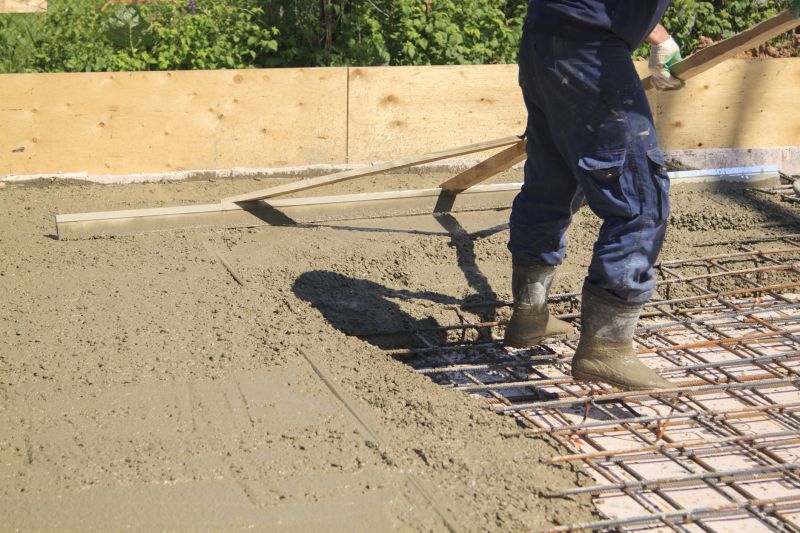Essential Products For Concrete Installations To Simplify Your Work
Equip yourself with key tools and supplies that make concrete installation projects faster, easier, and more precise.
 Concrete installations are fundamental components in both residential and commercial construction projects. From driveways and sidewalks to foundations and decorative elements, selecting the right products ensures durability, safety, and a professional finish. The process involves various materials and tools designed to facilitate proper mixing, pouring, curing, and finishing of concrete surfaces. Proper selection and application of these products can significantly influence the longevity and appearance of the finished work.
Concrete installations are fundamental components in both residential and commercial construction projects. From driveways and sidewalks to foundations and decorative elements, selecting the right products ensures durability, safety, and a professional finish. The process involves various materials and tools designed to facilitate proper mixing, pouring, curing, and finishing of concrete surfaces. Proper selection and application of these products can significantly influence the longevity and appearance of the finished work.
Top Overall Option
Versatile Concrete Mix
A high-quality concrete mix that offers consistent workability and strength, suitable for a wide range of applications from small repair jobs to large-scale installations. It provides reliable setting times and durability, making it a popular choice among professionals and DIYers alike.
Types of Products For Concrete Installations
Concrete Mixes
Pre-mixed or custom-blended concrete formulas designed for various strength and setting time requirements.
Reinforcement Materials
Rebar, wire mesh, and fiber reinforcements used to add strength and prevent cracking.
Formwork Systems
Molds and panels that shape and support poured concrete during setting.
Concrete Vibrators
Tools used to eliminate air pockets and ensure proper compaction of the concrete.
Finishing Tools
Floats, trowels, and edgers used to smooth and shape the surface of the concrete.
Curing Products
Curing compounds, blankets, and sprays that help retain moisture and promote proper hardening.
Sealants and Waterproofing
Products applied after curing to protect the surface from moisture and wear.
Admixtures
Chemical additives that modify setting time, workability, or durability of concrete.
Concrete Cutting Equipment
Saws and blades designed for precise cutting of hardened concrete.
Expansion Joints
Materials used to allow for movement and prevent cracking in large slabs.
Surface Repair Products
Patch compounds and overlays for repairing and restoring concrete surfaces.
Concrete Dyes and Stains
Coloring agents used to enhance the aesthetic appeal of concrete surfaces.
Form Release Agents
Chemicals that facilitate easy removal of forms after concrete sets.
Concrete Anchors and Fasteners
Hardware used to attach fixtures and structural elements to concrete surfaces.
Vapor Barriers
Materials installed beneath slabs to prevent moisture migration.
Popular Choices
Widely used for structural applications requiring enhanced durability and load-bearing capacity.
Includes synthetic or steel fibers integrated into the mix to improve crack resistance.
A flowable product ideal for creating smooth, flat surfaces on existing concrete or substrates.
Popular for sealing and protecting concrete surfaces with a glossy or matte finish.
Flexible materials used to accommodate movement and prevent cracking.
Tools favored for creating decorative or functional edges and control joints.
Convenient for quick repairs or projects with tight timelines.
Pre-packaged solutions for addressing minor cracks and surface imperfections.
Essential for below-grade or exposed concrete to prevent water intrusion.
Portable equipment used for precise cuts in hardened concrete for expansion joints or modifications.
Commonly installed beneath slabs to control moisture migration.
Popular for enhancing aesthetic appeal with color and pattern.
Widely used to facilitate clean removal of forms and achieve smooth finishes.
Used for attaching fixtures securely to concrete surfaces.
Products that delay setting on the surface to create decorative textures.
In Covington, Louisiana, where construction projects often need to withstand the local climate and soil conditions, choosing reliable products is essential. Whether you are a DIY enthusiast or a professional contractor, understanding the different types of products available can help you make informed decisions. High-quality concrete mixes, reinforcement materials, formwork, and finishing tools are just some of the key components involved in successful concrete installation.
The right accessories and supplies can also aid in managing common challenges such as cracking, uneven surfaces, or improper curing. Investing in products that provide consistent performance and ease of use can streamline your workflow and improve results. It is important to consider factors like compatibility with existing materials, ease of handling, and the specific requirements of your project when selecting these products.
Overall, a well-planned approach to selecting concrete installation products can lead to durable, visually appealing, and structurally sound results. Whether for small residential projects or large-scale commercial endeavors, understanding the options available will help ensure your project’s success and longevity in the local Louisiana environment.
Key Buying Considerations
- Determine the specific application and choose products designed for that purpose.
- Consider the local climate and soil conditions in Covington, LA, to select appropriate materials.
- Check compatibility between different products, such as mixes and reinforcement materials.
- Evaluate the ease of handling and application of tools and accessories.
- Assess the curing and drying times to meet your project schedule.
- Look for products with clear instructions and reliable performance records.
- Select products that accommodate the structural load requirements of your project.
- Consider the size and scope of your project to determine quantity needs.
- Review safety instructions and proper usage guidelines for all products.
- Choose products that provide consistent quality to avoid issues like cracking or uneven surfaces.
- Factor in budget considerations while prioritizing quality and durability.
- Ensure availability of replacement parts or accessories if needed.
- Verify that the products meet any relevant local building codes or standards.
- Think about future maintenance and whether the products facilitate easy repairs or updates.
- Research customer reviews and expert recommendations to inform your choices.
